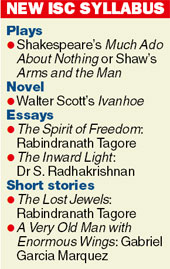 |
Shakespeare has sacrificed his Macbeth so that ISC students can devote more time to math.
The Council for Indian School Certificate Examinations has decided to “lighten” the ICSE and ISC English syllabi in response to suggestions from school heads and teachers who think their students need to focus on science subjects.
Students writing their ISC from 2015 onwards would study Shakespeare’s Much Ado About Nothing instead of a “complex” Macbeth, though opinion is divided on whether replacing a tragedy with a comedy would make the Bard any easier to understand and appreciate.
George Bernard Shaw’s Pygmalion has made way for Arms and the Man in the Class XII syllabus.
For ICSE, the council has chosen The Merchant of Venice to replace As You Like It.
The decisions were arrived at after a series of meetings in Delhi. A council official said that a circular notifying the changes would be sent to the affiliated schools soon.
The number of poems, essays and short stories in the ISC syllabus has been slashed from 15 to 10. All the essays, poems and short stories are different from the ones in the old course. Ditto for ICSE.
One of the suggestions was to exclude Shakespeare from the English syllabus but the council rejected the idea.
English teachers in many city schools welcomed the decision to reject the chop-Shakespeare plea. “We are happy that the council has at least rejected the suggestion on pushing out Shakespeare. Students rarely read the classics these days and it is our duty to encourage them to do so,” said a teacher in a south Calcutta school.
Tirtha Prasad Mukherjee, who heads the English department at Calcutta University, backed the council’s decision to replace Macbeth with a comedy and As You Like It with Merchant of Venice for Class X.
“Macbeth is a more serious play, informed by such tragic themes as murder, parricide, depression and even schizophrenia…perhaps more conducive to understanding at a more matured level,” he said.
Mukherjee said comedies were always a better choice for schoolchildren.
“The early comedies celebrate the more joyous elements like love and intrigue. Comedies are recommended at the school level because they are easier to understand and fun to read.”
Not everyone agrees. Many teachers argue that if teaching Shakespeare is the objective, then it would be better to give young students a taste of the best of his works.
Retired CU professor Dipendu Chakraborty is all for Shakespearean tragedies. “Shakespeare is famous for his tragedies. The best way to acquaint students with a Shakespearean tragedy is by teaching Macbeth. It tells a brilliant story, shows the transformation of a character and teaches a lesson or two about the life the children will step into in the years ahead.”
The Merchant of Venice is a less contentious choice. “It has been taught in school for ages along with Julius Caesar and is thoroughly enjoyable,” said a teacher at St. James’ School.
Students focused on the career-defining competitive entrance exams that lie ahead of them are unlikely to complain about the attempt to make Shakespeare less heavy-duty, if that is possible.
“It is difficult to relate to As You Like It. It all seems to be happening in a different world. I know the story of The Merchant of Venice and much prefer that play,” said a student of La Martiniere for Boys.
What do you think of science dictating the study of literature? Tell ttmetro@abpmail.com










